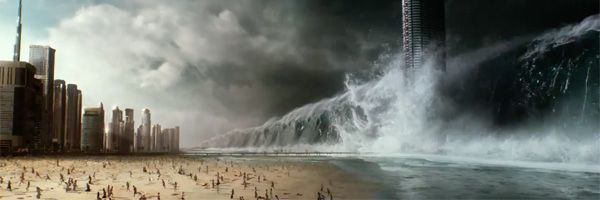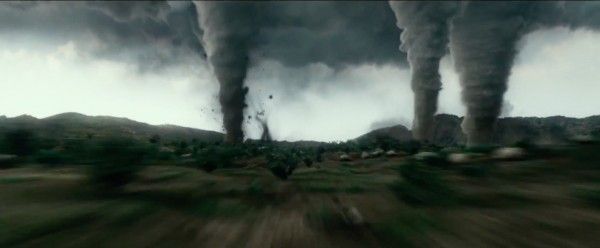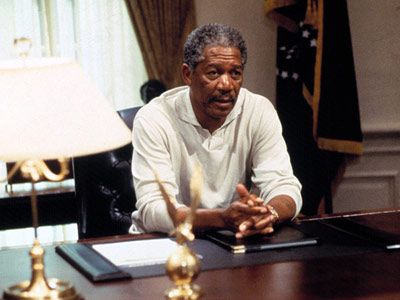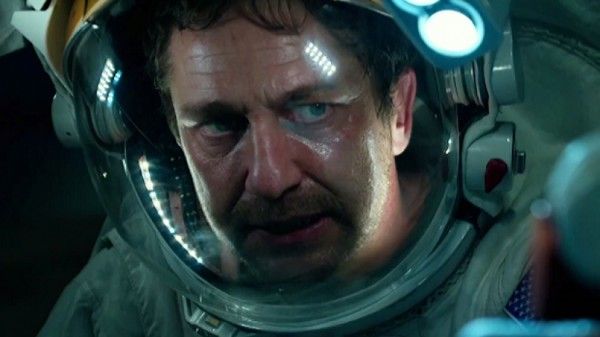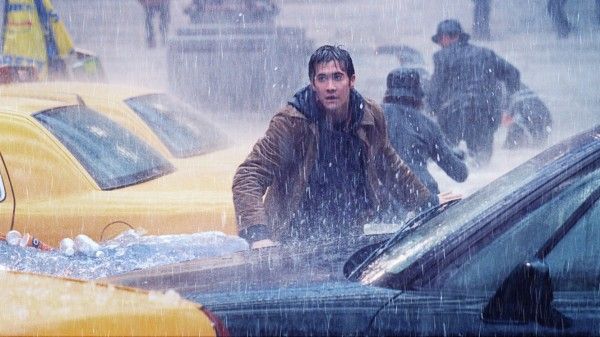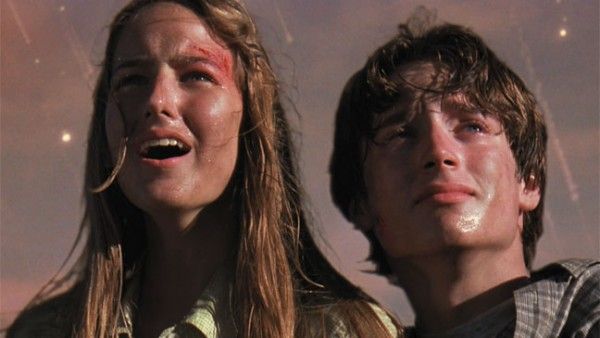Even if one were to only see the trailer for Geostorm, it would be clear that the movie is not just about an absurdist convergence of every natural disaster mother nature ever cooked up. The crucial failure that brings upon the titular apocalypse, per Andy Garcia’s president, is one of technology, as worldwide weather is not controlled by a series of satellites and fail-safes put in place by a coalition of international governments. In other words, rather than finding a way to cut down on the behaviors that cause global warming, we invented a way to take control of nature away from nature. What’s more, when that fantastical technology fails in Geostorm, it’s not some miscalculation in the design or implementation that brings about utter bedlam but rather the actions of a single powerful person or small group that was capable of infiltrating the system. The attitude of the movie is that we conquered nature. Where technology or those in power failed to protect the planet, Gerard Butler and his merry band of heroes will succeed.
This conceit may seem particularly ludicrous in the face of a crisis, but it stems from a lineage of disaster movies that go to extreme lengths to avoid showing convincing cause and effect or laying blame on anyone for the dire current state of climate change. Even before the state of climate change wasn’t particularly well-detailed in movies, as in Twister, The Core, Volcano, and Dante’s Peak, the general tone of the films’ politics is one that posited nature as an enemy. The tornados in Twister and, for that matter, in 2014’s Into the Storm essentially stalk the main characters in a style that would impress Jason Vorhees. The lethal trials that must be cleared to get to the earth’s center in The Core are closer to the deathtraps of The Collector, The Collection, or Saw 2 than an urgent journey of scientific need. One would be excused for thinking that we are meant to have an antagonistic attitude toward nature and Earth itself.
In what I guess you could call the “celestial disaster” movie Armageddon, the situation is a bit different but the undertone still stresses man’s dominion over not just Earth but the entire fucking universe. Indeed, Armageddon is the most magnificent fantasy of anti-environmentalist conservatism ever produced. In essence, director Michael Bay and co-writers J.J. Abrams & Jonathan Hensleigh posit that the entirety of NASA, scientific experts from across the globe, and even high-ranking military officers will fail to save the planet, but a cadre of degenerate off-shore oil-rig workers, led by a macho millionaire named Harry Stamper (Bruce Willis) can get the job done. Even if one were to ignore all of that, Bay goes the extra mile to make the asteroid itself villainous, adding growling noises to its overtly ominous design to eradicate any sense of the cold, absolute indifference of the great wide galaxy.
There’s a greater sense of that indifference in Deep Impact, which ends with a portion of the original asteroid actually hitting Earth. The movie, directed by Mimi Leder, ends with tidal waves consuming dry land and washing out untold amounts of citizens, but it also egregiously suppresses the human element of the end times. There’s no sense of panic, no urgency or philosophical crisis to the behavior of the characters, whether they be major or just in the background. A few days after the President (Morgan Freeman) announces that an asteroid will likely be hitting the Earth soon, there are still people jogging for exercise and no grocery stores or pharmacies are looted. In one storyline, a reunion between an elderly father and his adult daughter takes center stage over the end of civilization. Toward the end of the movie, on the day of impact, New York’s Washington Square Park is packed with people, none of whom seem to be aware that their placement means their imminent death.
There’s no sense that Leder or co-writers Bruce Joel Rubin and Michael Tolkin are angry at the indifference of the public in Deep Impact, nor is there any real feeling for the human or governmental processes that would be speeding into motion. It’s closer in tone to early disaster blockbusters like Earthquake and The Towering Inferno, where the point was to put a series of well-known actors into a smattering of scenarios pivoting around a grand-scale disaster. The reality of a world on the brink of ending is not as important as what goes on between Elijah Wood and Leelee Sobieski, Ron Eldard and Robert Duvall, Tea Leoni and Vanessa Redgrave, or Freeman alone, lending gravitas to a series of inept end-of-days speeches.
There’s no overt belittling of the government in Deep Impact, but the only grace that can be found in the world is a vaguely religious ambivalence toward physical life, a bizarre and nonsensical acceptance that whatever happens in this world will happen no matter what we do. Even the film’s Armageddon-like manned mission to bomb the asteroid is marked by a sedated acceptance of mortal fate, reflecting an unconvincing keep-calm-and-carry-on view of civilization in its purported death throes. Deep Impact's focus on human connection in the face of the end times might even be somewhat inspiring if the writers didn't depend on sentimental platitudes and rote familial dynamics to showcase humanity and society at large.
2009’s 2012, the second of Roland Emmerich’s riotous climate change disaster movies, makes similar gestures. Both 2012 and Emmerich’s The Day After Tomorrow are guilty of asserting that the total effects of climate change will be felt in one fell swoop, that the evidence will be overwhelming in the moment but also far too late to do anything substantial to counteract the destruction. One could see these films as overinflated responses to such memorable climate change denials as Oklahoma senator Jim Inhofe’s proclamation that global warming is bogus because he could still make a snowball. In the case of 2012, the death of the Earth comes from the collapse of the planet’s crust, suggesting more of a focus on the effects of fracking and doing damage to the land rather than the sky. Still, the movie maintains that the world at large is mostly unaware of the effects of the damage humankind does to the Earth, and that preparing for a cataclysmic flashpoint rather than imposing harsh rationing and regulations is necessary, smart, and American in the best way.
Even in its personal drama, 2012 undermines the urgency of what’s happening by suggesting that this collapse has as much to do with real environmental factors as a prophecy that estimated the world would end on 12/21/2012. And like The Day After Tomorrow, the core of the film’s drama centers on a family being reunited, ultimately giving the struggles of John Cusack and Amanda Peet a biblical tint. In contrast, and to its credit, The Day After Tomorrow puts the fault squarely on climate-change deniers and the lack of concern for global warming in governmental institutions.
The Day After Tomorrow operates in a fictional world where the UN is caught unawares by ecological catastrophes like killer hail storms or twisters decimating Hollywood. The film’s focus, however, is less on how those in charge would react to nature’s comeuppance and more on a genius father (Dennis Quaid) saving his genius son (Jake Gyllenhaal) amongst the glorified CGI wreckage of Earth gnawing at its own belly. This chaos is what gives Emmerich's films their paltry thrills, even as he avoids highlighting the sheer amount of dead bodies there would be or the fact that things would only get worse after the events in The Day After Tomorrow. The director and his writers evince an unconvincing hopeful ending rather than even intimate that the human experience from here on out is survival and survival alone.
The addition of the failure of technology in Geostorm speaks to how these astoundingly misguided takes have both advanced and remained in a sort of stasis. Geostorm posits that technology will save us momentarily but it can’t possibly save us from the weakness of humankind and the power-hungry elites, aka those who control the technologies. For all of Silicon Valley’s advances, the job of saving the planet, or at least making the losses as low as possible will still default to the blue-collar strongman, even if he happens to be an astronaut or doctor. Even Quaid’s character in The Day After Tomorrow is proven to be in peak athletic shape and his ability to be plainspoken is regularly highlighted. Well over a decade after An Inconvenient Truth and some 40 years after Wallace Broecker’s groundbreaking "Climatic Change: Are We on the Brink of a Pronounced Global Warming?,” the movies are still looking for a proverbial Superman or Justice League to rescue us, when little more than a few honest politicians, an engaged public, and unfettered expertise would do.

